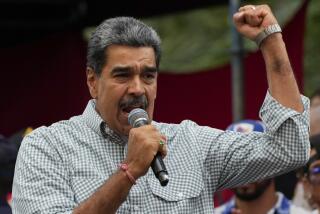Venezuela Detains Dissident General
- Share via
CARACAS, Venezuela — Police detained a dissident general Monday as a nationwide strike against President Hugo Chavez marked its 29th day.
The strike has shut off shipments from the world’s fifth-largest oil exporter, and police used tear gas Monday to separate opponents and supporters of Chavez outside the state oil monopoly’s headquarters in Maracaibo, the hub of the country’s oil-producing west.
Strike leader Carlos Ortega, who heads Venezuela’s largest labor federation, called on all citizens to stop paying their taxes.
Secret police arrested national guard Gen. Carlos Alfonso Martinez, one of dozens of dissident military officers who have occupied a square in Caracas, the capital, for three months in rebellion against Chavez.
About 60 people protested the arrest outside the headquarters of the secret police. Officers tried to disperse the protesters with tear gas. An ensuing rock fight between protesters and Chavez supporters injured 10 people, city Fire Chief Rodolfo Briceno said.
The government accuses Martinez and other officers of involvement in an April coup that briefly toppled Chavez before he was restored to power by loyalist troops. A lawyer speaking for Martinez said the general had not been charged and that his detention was illegal.
“Whoever is responsible for this, whether it’s Hugo Chavez, the interior minister or the head of the national guard, we’ll identify and charge them,” lawyer Cipriano Heredia said.
Chavez, himself a former paratrooper, has kicked many renegade officers out of the armed forces and threatened to chase them from the square, but detaining Martinez is the toughest act against them so far.
The opposition, backed by business groups and unions, accuses Chavez of authoritarianism, corruption and economic incompetence in what it says is a quest to establish a Cuban-style dictatorship. Chavez says he is trying to reform the country and lift millions of citizens out of poverty.
Opposition leaders are demanding immediate elections and have refused Chavez’s offer of a referendum on his rule in August, saying that if they wait that long, he will ruin the country. Chavez says that under the constitution, August is the earliest date an election may be held to assess popular support for his rule.
More to Read
Sign up for Essential California
The most important California stories and recommendations in your inbox every morning.
You may occasionally receive promotional content from the Los Angeles Times.










